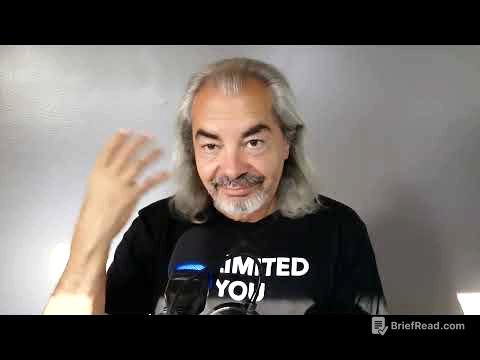TLDR;
This YouTube video discusses the implications of the Alaska summit between US President Donald Trump and Russian President Vladimir Putin on global diplomacy, particularly in relation to the Ukraine conflict. The panel explores whether the summit signals a new phase in international relations, moving towards bilateral engagement and how this affects various countries, including those in Africa and the BRICS nations.
- The summit was viewed as a show but necessary to bring the US and Russia together.
- The Europeans are seen as unrealistic and insane in their approach to the conflict.
- Africa has the potential to be a major player in the next 50 years but needs to address leadership issues and colonial mindsets.
- The BRICS nations are growing in strength and offer an alternative to the Western financial system.
- The key to successful diplomacy is communication, strategic dialogue, and serving the interests of nations while promoting global peace.
Introduction: Analysing the Alaska Summit [0:04]
The video introduces a discussion on the Alaska summit between Donald Trump and Vladimir Putin, examining its impact on global diplomacy, multilateralism, and geopolitics. The meeting, anticipated with anxiety, concluded without a clear resolution to the Ukraine conflict, raising questions about the future of global diplomacy. The panel aims to analyse the summit's implications for the Ukraine conflict and international diplomacy.
Panel Introductions and Initial Remarks [2:24]
The host introduces the panellists: Ashil Eki, a corporate finance expert; Dean Andrew Midday, editor of Executive Intelligence Review; and Professor Jagdesh Katri, an author and global analyst. Dean Midday believes the summit's main goal was to roll back the anti-Russian policies of the Biden administration and to bring the United States and Russia together for the first time in four years. Professor Katri notes the high expectations surrounding the summit but suggests that lasting solutions to long-standing issues require more than a single meeting.
African Perspective on the Summit [10:16]
Ashil Eki shares an African perspective, viewing the summit as a necessary show to bring the US and Russia together, as the US is fighting Russia through NATO and Ukraine. He notes that the US knows they started the war by expanding eastwards near Russia, violating previous agreements. Eki highlights the economic cooperation potential between Russia, China, and African countries, which has been hindered by the war. He expresses hope for peace to allow for continued business and to stop the loss of life.
Summit's Impact on Diplomacy and Ukraine Crisis [15:50]
Dean Midday argues that the summit's primary aim was to resolve the conflict between the West and Russia created by the Biden administration. He describes Trump as having a dual nature, wanting good relations with Russia while also engaging in tariff wars. Midday criticises the Europeans for their unrealistic stance on the war, their plans for rearmament, and their threats towards Russia. He suggests that cooperation between Russia and the US is crucial for the world and mentions a proposal to build a tunnel between the Bering Straits as a point of cooperation.
India's Perspective and Diplomatic Challenges [23:07]
Professor Jagdesh Katri discusses the summit's impact on India, particularly regarding the 50% tariff threat. He questions why India is being penalised for buying Russian oil when China buys more. Katri suggests that the tariffs may be a pressure tactic to secure a favourable trade agreement with the US. He also introduces a new theory of AI, "alignment of interests," where alliances are based on shared interests rather than ideologies.
Contemporary Diplomacy and Arctic Development [29:19]
Dean Midday agrees with Professor Katri on the shift from alliances of ideologies to alliances of interests. He argues that tariffs are not in the US's interest and that the US needs to cooperate in global development. Midday highlights the Arctic as an area for economic cooperation with Russia, suggesting the construction of a tunnel beneath the Bering Strait. He also criticises the financial outlook of the Trump administration, particularly concerning cryptocurrencies, warning of a potential financial crisis.
Africa's Role in Contemporary Diplomacy [35:17]
Ashil Eki discusses Africa's potential as a major player in the next 50 years, noting a shift in mindset that is scaring developed countries. He argues that developed countries have historically sought to exploit Africa's resources and prevent its industrialisation. Eki emphasises the need for Africa to get involved in global matters and reorient its economies away from dependence on the US and Western countries. He also points out the leadership challenges in Africa, where many leaders are subject to pressure from Western countries.
Africa's Diplomatic Challenges and Strategic Partnerships [45:26]
Ashil Eki stresses the importance of unity and courageous leadership for Africa to have its voice heard. He highlights the example of the Sahelian countries forming a confederation to combine their forces. Eki criticises the lack of concrete plans and strategies at Africa-focused summits, advocating for a unified approach through the African Union. He calls for Africa to navigate through difficulties, form strong partnerships with BRICS countries, and fight for its interests.
Geopolitical Dynamics and the Ukraine Conflict [52:08]
Dean Midday agrees with Professor Au and Eki, noting that the US also faces forces like the British and French Empires, which continue to exist through the international Western financial system. He argues that the US needs allies like Russia and China to change this system. Midday suggests that a productive relationship between the US and Russia could lead to financial reform and the elimination of the IMF and World Bank system.
Europe's Position and the Balance of Power [57:30]
Professor Jagdesh Katri discusses Europe's difficult situation, feeling taken for granted in negotiations on the Russia-Ukraine crisis. He notes divisions among European countries regarding military involvement. Katri draws a parallel to the Yalta Conference in 1945, where the map of Europe was redrawn without involving affected countries, expressing concerns that a similar situation may arise with the Trump-Putin summit. He stresses the need for all concerned parties to be involved in any peace agreement.
US-Russia Relations and Global Diplomacy [1:04:37]
The host reiterates that diplomacy is about dialogue, interests, and communication that primarily serves a nation's interests. The panel discusses how the Alaska summit is affecting the contemporary standing of diplomacy. The discussion touches on the importance of strategic communication and dialogue that suits the interests of nations.
Strategic Positioning and Global Impact [1:05:21]
Ashil Eki argues that the international court's decision against Putin was political and without substance. He notes the confusion among European countries as they rely on the US to fund the war in Ukraine. Eki suggests that France is pushing for war to avoid accountability and that the sanctions against Russia are not working. He highlights the growing strength of BRICS countries and their potential to protect Africa from Western predators.
EU Leaders and Shifting Alliances [1:14:16]
Dean Midday discusses Trump's outspoken stance on EU leaders and Ukraine's president, questioning the EU's awareness of the shifting international lines. He asks how nations, especially in Europe, can strategically position themselves to protect their interests in an increasingly multipolar society.
Defining Interests and Economic Cooperation [1:16:28]
Dean Midday defines the centre of any country's interest as the development of the creative potential of the individual human being. He suggests that Europe's strength lies in its machine tool sector, which could be used to industrialise Africa. Midday argues that Europe should focus on high-tech investments and infrastructure rather than tariffs. He criticises the political class in Europe as hopeless and suggests that a simmering revolt is brewing in the population.
Europe's Strategy and Global Collaboration [1:23:57]
Professor Jagdesh Katri agrees that European nations seem confused and are facing economic problems. He notes that European leaders are trying to keep the war going while their economies are suffering. Katri suggests that Europe needs to strengthen itself internally and then try to influence geopolitics. He argues that sanctions have not proven their worth and that a lasting peace cannot be achieved through arm-twisting.
New Era for US-Russia Ties and International Diplomacy [1:29:49]
Steve Gil argues for focusing on developing Africa rather than investing in facilities on the moon or Mars. He agrees with Professor Rajid that tariffs have unintended consequences and are inconsistent. Gil expresses concern that the US will become addicted to tariff revenue and that Congress will spend the money quickly. He notes the contradictory policies of the Trump administration, which seeks to punish Russia while also trying to improve relations.
Strategic Foreign Policy and Global Impact [1:36:15]
Steve Gil believes that the US's foreign policy is confusing and contradictory. He notes that Trump's policies are pushing more countries into the embrace of the BRICS nations and that the US has pushed Russia closer to China. Gil expresses confusion about the US's strategy and policy going forward.
Multilateralism and Bilateral Engagement [1:38:14]
Steve Gil likes the meeting in Anchorage because it symbolises the US looking west towards Russia rather than through the filter of European Union nations. He believes that direct communications with world leaders are more likely to yield better results. Gil suggests that Trump may be poised to wash his hands of the Ukraine conflict and focus on business opportunities with Russia.
Threat to BRICS and De-dollarisation [1:40:26]
Ashil Eki argues that the objectives of the BRICS block are opposite to those of the US. He criticises Trump's tariff policies as a game and suggests that they will have a negative impact on the US and world economies. Eki notes that the dollar is going south and that de-dollarisation is working. He believes that Trump's actions are driving BRICS countries closer together.
Analysing Trump and the European Situation [1:41:51]
Ashil Eki says that Europe is lost in all of this, as they don't have the support of Biden anymore. He thinks that their hope is that the war continues until Trump leaves and a Democrat comes to power. Eki believes that the war in Ukraine is a good thing because it's going to save the world from World War II. He says that the economy has changed and that there's a paradigm shift to the south or the BRICS advantage.
Trump's Relationship with Putin and International Relations [1:50:10]
Dean Midday says that you can't analyse Trump too closely from what he says and does. He thinks that if the relationship between Trump and Putin pans out, it can't help but to have a positive effect internationally. Midday suggests that Russia and China have hesitated in going strong on the issue of Gaza because they feel that this is a US problem. He believes that if Trump goes to China soon, then there will be a very different global dynamic of forces.
India, China, and the BRICS Countries [1:53:51]
Professor Jagdesh Katri says that Trump has actually helped bring BRICS countries more cohesive and that India and China are also posing up to each other. He says that sanctions will never bring any solution and that they cannot be permanent. Katri believes that all the efforts by Trump will bring peace to Ukraine and to Gaza.
Concluding Statements: New Trajectory in International Diplomacy [1:56:06]
Steve believes that the Alaska summit is writing a new trajectory in international diplomacy. He asks whether India will follow the blueprint of Russia and become more self-reliant.
Dean says that we're seeing the end of geopolitics and that this will end the whole zero-sum diplomacy. He believes that we're going to see cooperative relationships developing among India, the United States, China, and Russia.
Ashil Eki says that European countries have to stop lying to their people and suppressing dissenting voices. He thinks that the war in Ukraine is actually a good thing because it's going to save the world from World War II.
Professor Chhattisha says that we are living in the age of interdependence and that no country can survive without help from others. He believes that sooner or later we have to have peace.









